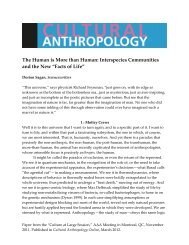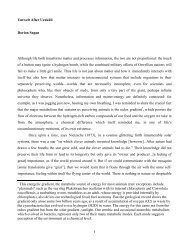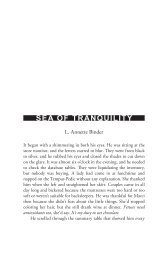PESTICIDES IN COCA-COLA AND PEPSI - Cultural Anthropology
PESTICIDES IN COCA-COLA AND PEPSI - Cultural Anthropology
PESTICIDES IN COCA-COLA AND PEPSI - Cultural Anthropology
You also want an ePaper? Increase the reach of your titles
YUMPU automatically turns print PDFs into web optimized ePapers that Google loves.
CULTURAL ANTHROPOLOGY 22:4<br />
674<br />
“foreign” cachet of Coca-Cola and Pepsi was turned on its head into a liability, is<br />
provided by the mode of agitation, or “peformative aspects of protest” (Orlove<br />
1997:235) organized by several cultural nationalist organizations that took to the<br />
streets against the MNCs. The act of public destruction of Coca-Cola and Pepsi<br />
bottles was a purposive allusion to Gandhi’s political strategy of economic boycott<br />
of British (foreign) products, one of whose prominent techniques was to organize<br />
bonfires of British mill-made cloth. 19 In one stroke, the appellation of “foreign” was<br />
transmuted, from being an evocation of luxury and refinement, into a symbol of an<br />
oppressive and alien political power bent on economic exploitation. The bonfire,<br />
metaphorical in the case of Coca-Cola and Pepsi, is an intensely personal statement<br />
as well. It implies the willingness and the resolve to renounce something that is<br />
temporally important in the service of the greater good. “Alternatives” to Coca-<br />
Cola and Pepsi, mainly indigenous products, such as buttermilk and homemade<br />
lemonade, also gained ground, some of which had the same contaminated water, as<br />
Coca-Cola and Pepsi, as their main ingredient. 20 In this instance, it is the equation<br />
of “foreign” with “impure” and the “domestic” with “pure” that enables the symbolic<br />
inversion of the meaning of quality, and manages to elide the issue of contamination<br />
out of the picture. 21<br />
CONSUMERISM AS ENLIGHTENED SELF-<strong>IN</strong>TEREST: LIMITATIONS<br />
<strong>AND</strong> POSSIBILITIES<br />
What does the Coca-Cola–Pepsi pesticide controversy, and the subsequent<br />
policy response, tell us about the political possibilities of social consumerism? I<br />
submit that it offers important insights into the ongoing realignment between the<br />
state, society, and MNCs, and how public interest is conceptualized and contested in<br />
the public arena. Consumerism, despite its deterritorialized discourse, universalist<br />
pretensions, and unabashed narcissism can only be configured socially in fields<br />
that are culturally and ideologically constituted. Brand images of pesticide-tainted<br />
soft drinks being culturally mediated, the efforts of The Coca-Cola Company and<br />
PepsiCo to mold public opinion, notwithstanding their massive advertising budgets,<br />
were at best partially successful. Even the association with Bollywood glamour and<br />
euphoric endorsements from cricket icons failed to neutralize the negative media<br />
coverage. As the CSE said of the gyrating efforts of Bollywood stars in one of its<br />
reports: “they danced and sang to seduce us to go back to colas. But that is their<br />
job. They are paid actors.”<br />
Marketing efforts of The Coca-Cola Company and PepsiCo attempt to invoke<br />
a symbolic community—a community of feeling—transnational and based on






